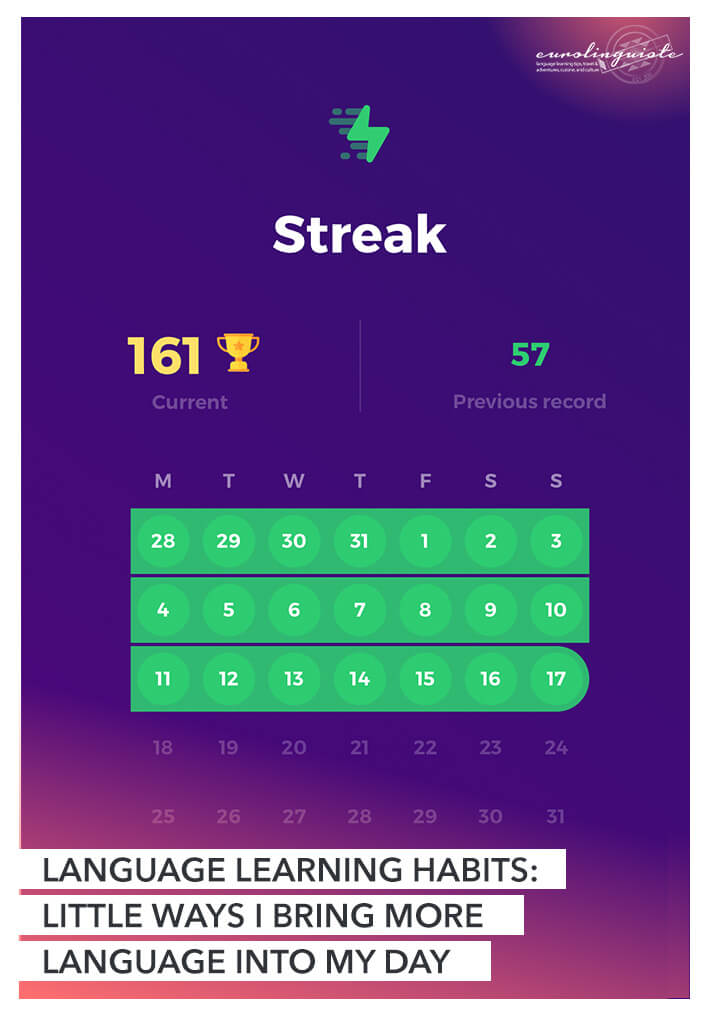Language Learning Habits: Little Ways I Bring More Language Into my Day

My name is Shannon Kennedy and I'm the language lover,…
Struggling to learn a new language with any consistency?
Establishing a new routine or habit can be challenging. But habits are so important in our day-to-day lives.
Did you know about 40% of our behaviors happen because of habits?*
That’s why it’s so important to establish good language learning habits.
But it’s not just forming habits you need to consider. You want to think about:
- Building strong habits
- Breaking bad habits
- Making habits last
What makes a good language learning habit?
A good language learning habit is something that starts small. It’s something quick and easy you can do each day so that you can build momentum with easy wins.
From there, you start increasing your habit in very small ways. And once it starts to get big, you break it into chunks.
And finally, when you get off track, it’s something that you get back to as quickly as possible.
So, for example, a good language habit could look something like this:
- Start small: 5 minutes a day on Drops learning new vocabulary
- Increase your habit in small ways: Add 5 minutes of podcast listening and once you start to comfortable with that, increase it to 10 minutes and then 15 minutes
- Break your habit into chunks: Don’t do your 20 minutes of study all in one block, instead, do your 5 minutes of Drops with your morning coffee and do your 15 minutes of podcast listening while washing dishes after dinner
How do you break bad language learning habits?
Do you have bad language learning habits?
For example… you let your tutor dominate the speaking time during your lessons rather than speaking yourself? Or you skip all the exercises in your course book?
James Clear states that bad habits are caused by one of two things: stress or boredom. Can you relate to this in your language learning?
Perhaps if you let your tutor do most the talking, the idea of speaking stressing you out. Or maybe those course book exercises are boring to you.
So how do you break a bad habit?
Get accountability!
When you’re aiming to make changes, accountability is one of the best things you can give yourself.
Sharing your intentions with someone is one of the best ways to make changes, but what can be even better is teaming up with someone with the goal of making the same change together.
Which makes this the perfect point for me to share Language Conqueror!

This upcoming month in Language Conqueror, we’re talking all about habits. How to set good language learning habits, how to deal with time constraints, and so much more.
You can join us and learn more here.
Plus, you’ll get fantastic accountability with our community.
Make Your Language Learning Habits Stick
Sometimes, things get busy… or, busier.
The key to keeping up your habits long-term is to plan for when (not if) that happens.
James Clear suggests:
- Reduce scope: temporarily reduce your habit and do less so that you can still keep up your learning even if you’re not doing as much
- Develop a contingency plan: for example, “if I am not able to listen to my podcast while doing dishes, then I will listen to it later in the evening and watch 15 minutes less of Netflix”
These two tactics can help you stay on track even when something unexpected comes up.
Examples of Language Learning Habits
I’ve been thinking a lot about how I might divide up my study time and I realized, I change this up quite a bit. I thought I’d create a roundup of all the different tactics I use and share them with you if you need a little bit of inspiration.
Here are just a few of the “snack-sized” language learning habits I’ve set up to help me make sure language learning is a part of my day:
- Rather than use the emoji keyboard I switch to my Chinese keyboard and type the emotion in Chinese – the emoji usually shows as one of the results
- My phone is in Croatian but Siri is in Chinese (it’s great for pronunciation practice!)
- I tie language learning to location: any time in my car is attached to a language podcast or audio lesson
- I tie language learning to a set time: 10am every day is when I have a one hour lesson for one of my languages
- I tie language learning to a marker: I take notes until the end of the page in my notebook, I study until I reach the end of a chapter, or until the end of a video, or until I’ve copied over all the new words into my flashcards, or when a page ends with a period – especially when reading in a language (I hate to end on a page that ends with only half a sentence)
- I tie my language learning to stats: I count my habit complete for the day once I reach a certain number of points in an app, a certain number of learned words, or some other stats goal I’ve set
Over to You
What about you? What are some of the language habits you have or are trying to set? Let me know in the comments below!
And don’t forget, we’re starting a new Quest as a part of Language Conqueror next month and there’s still time to join us!


My name is Shannon Kennedy and I'm the language lover, traveler, and foodie behind Eurolinguiste. I'm also the Head Coach of the Fluent in 3 Months Bootcamp, co-founder of Women in Language, and former Resident Polyglot at Drops.






